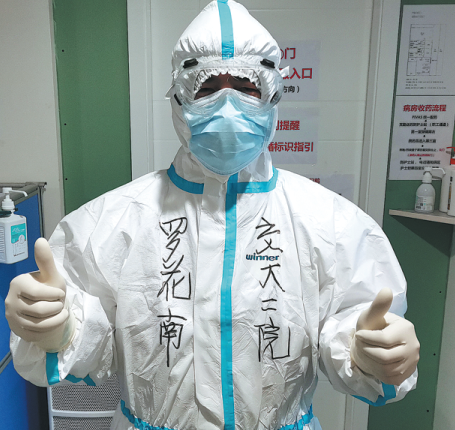Coming to the rescue
By Zhang Lei | CHINA DAILY | Updated: 2020-03-05 07:17

Wuhan connection
Wuhan, the city that's today the epicenter of the epidemic, is where Luo's dreams and ambitions came true years ago.
Luo attended Huazhong University of Science and Technology in Wuhan from 2000 to 2005. His most recent trip to the city was for a reunion of classmates in 2015.
"When I heard about the outbreak, I immediately thought that I had to do something for my alma mater, for the city where I had studied and lived, to help it get better as soon as possible," he says.
Luo laments the ostensible distance between patients and medical staff clad in facemasks, goggles and protective suits. He hopes patients can recover soon, and be comforted by family and friends.
"Some patients who'd just arrived and talked to me with gratitude on my first shift were gone by my following shift. We felt very depressed, especially when a patient was taken directly to a funeral parlor after he died," he says.
"But we have to wipe away our tears and stand firm because there are still many patients who need immediate treatment."
Luo's family initially opposed his decision to sign up for the epidemic-assistance team. They worried his body hadn't yet fully recovered from returning from altitudes around 4,300 meters in Tibet.
Still, he and his wife, who's a nurse at the same hospital, signed up when they received a notice recruiting volunteers to work in Wuhan.
His application was accepted. Hers wasn't.
"My wife was at a loss," he recalls.
"At this critical moment, my family realized the severity of the situation. They then supported me like they did when I went to Tibet."
Luo was impressed by his colleagues' continuous care and psychological support for COVID-19 patients.
"Some of us give the patients daily-use items and medicines. Many who were discharged asked to take pictures with, and even bowed to, us," he says.
Luo hopes society will respect medical workers and that there will be fewer attacks against them after the epidemic.
The outbreak has also exposed some problems in infectious-disease prevention and control, and in public health, he says.
"We could further rectify laws and regulations, such as the Law on Prevention and Control of Infectious Diseases and the Law on Wildlife, to avert such tragedies," he says.
"After the epidemic, I'd like to spend more time with my family, especially my children. I've been supporting Tibet or Hubei for the past two years. I've been traveling abroad. I haven't been with them much.
"In addition, I want to take them to Wuhan to appreciate the grandeur of the mountains, rivers and forests there, in the place where I once studied and fought."
























